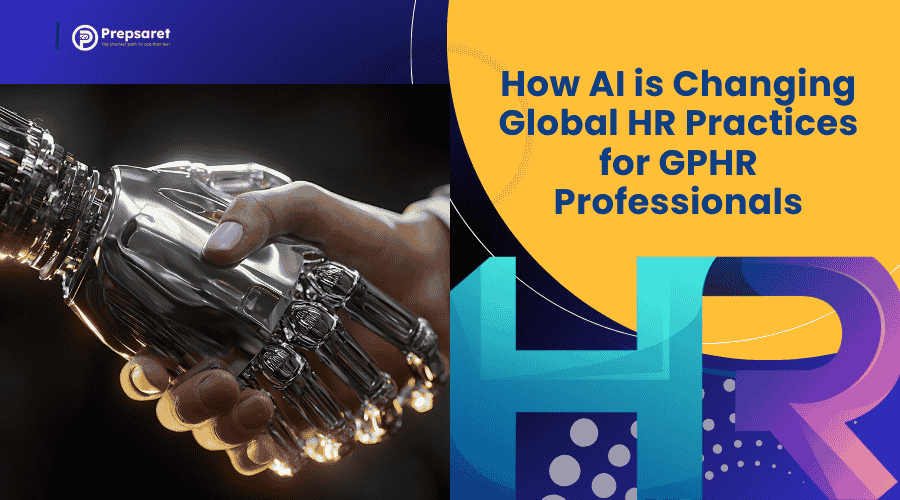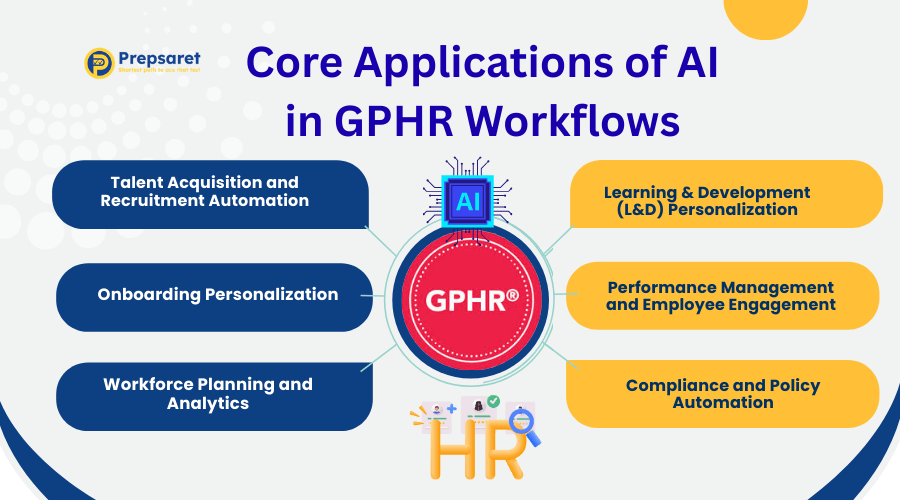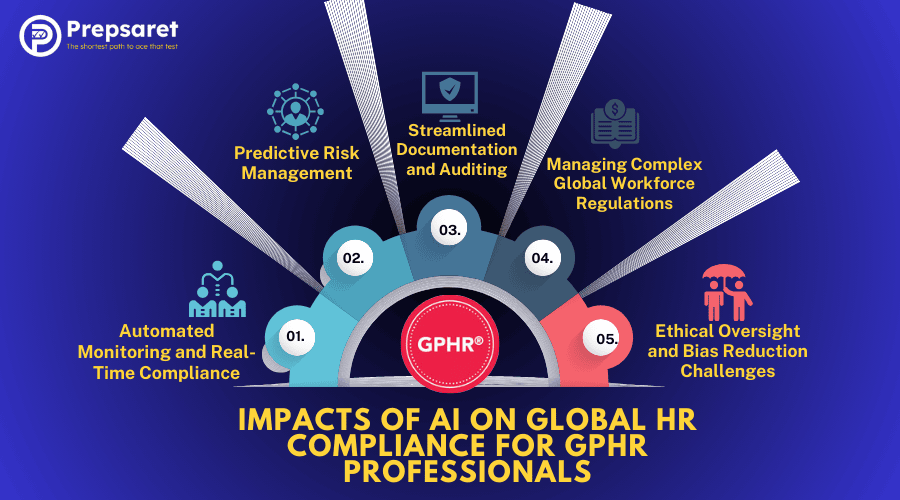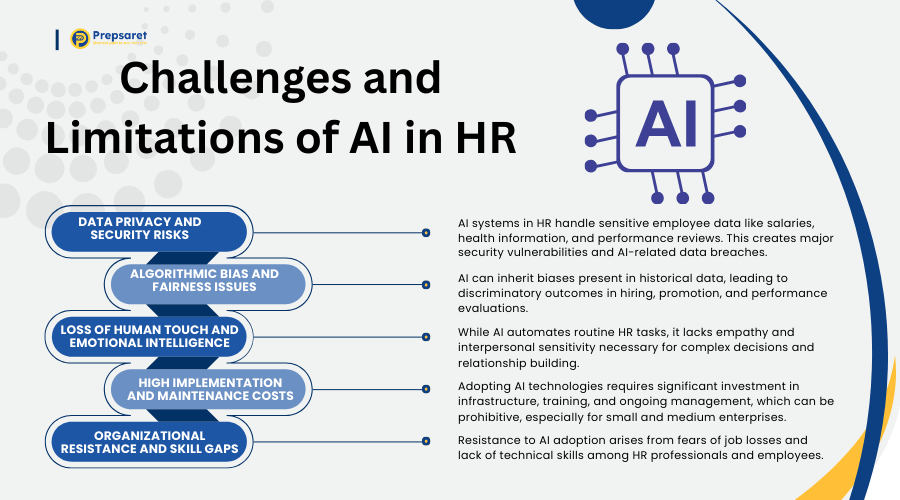How AI is changing global HR practices for GPHR professionals has become a critical conversation in today’s workforce landscape. Artificial intelligence in human resources goes beyond resume screening or chatbots, it now includes machine learning, predictive analytics, and intelligent automation transforming how organizations manage international talent.
For Global Professional in Human Resources (GPHR) certified professionals, platforms like Prepsaret provide essential tools to master these AI-driven skills and stay competitive. As companies expand globally and navigate complex compliance requirements, how AI is changing global HR practices for GPHR professionals is redefining talent acquisition, performance management, and strategic value in international HR operations.
The Rise of AI in Global HR Practices
The evolution of AI in global HR practices has been nothing short of remarkable. What started as a tech buzzword in corporate boardrooms has rapidly transformed into an essential HR tool that’s reshaping how organizations manage their international workforce.
Artificial intelligence in human resources management has moved from experimental pilot programs to core business operations in just a few years.
How AI is Changing HR on a Global Scale
- Recruitment Revolution: AI-powered systems now screen thousands of international candidates simultaneously, identifying top talent regardless of geographic location
- Real-time Decision Making: Machine learning algorithms analyze workforce data across multiple countries to provide instant insights for strategic planning
- Language Barriers Elimination: Natural language processing tools enable seamless communication across diverse, multilingual teams
- Compliance Automation: AI systems continuously monitor changing labor laws across different jurisdictions, ensuring organizations remain compliant
Global companies like Unilever have implemented AI-driven recruitment processes that eliminate human bias while identifying candidates from over 190 countries. Similarly, IBM’s Watson has been deployed across their international offices to provide personalized employee experiences regardless of cultural context.
The shift toward AI in global HR practices isn’t just about efficiency, it’s about creating more inclusive, data-driven, and strategically aligned human resources operations that can adapt to the complexities of managing talent across borders, cultures, and regulatory environments.
Related post: GPHR certification and global HR trends
Core Applications of AI in GPHR Workflows
For GPHR professionals, understanding the practical applications of AI tools for cross-border HR management is crucial for career advancement and organizational success. These tools are revolutionizing how international HR teams operate on a daily basis.
Automating HR Processes with AI in Recruitment and Onboarding
Automating HR processes with AI has transformed the talent acquisition landscape. Modern AI systems can:
- Screen resumes in multiple languages while identifying cultural nuances in candidate presentations
- Conduct initial video interviews using facial recognition and sentiment analysis to assess candidate fit
- Create personalized onboarding experiences that adapt to local customs and legal requirements
- Match candidates to roles based on skills, experience, and cultural alignment with specific office locations
AI-Powered Global Workforce Management and Analytics
AI-powered global workforce management enables GPHR professionals to:
- Predict turnover rates across different regions and cultural contexts
- Optimize workforce distribution based on project demands and local talent availability
- Monitor employee engagement through sentiment analysis of communications and feedback
- Identify skill gaps before they become critical business issues
Examples of AI in HR for GPHR Professionals
Examples of AI in HR demonstrate the tangible impact on global operations:
- UNICEF – Uses AI-powered recruitment tools to manage large applicant pools for global humanitarian projects, ensuring faster candidate screening across multiple countries.
- World Health Organization (WHO) – Applies AI in HR decision-making to analyze workforce distribution and address skill shortages in critical regions.
- International Red Cross – Employs AI-driven talent acquisition for GPHR to identify and mobilize multilingual volunteers during global crises.
- Amnesty International – Leverages AI in employee performance tracking to coordinate and monitor teams across culturally diverse regions.
Benefits of AI in HR for Global Organizations
The benefits of AI in HR for global organizations include:
- Cost reduction of up to 40% in recruitment processes
- Time savings of 70% in resume screening for international positions
- Improved diversity with 25% more inclusive hiring practices
- Enhanced compliance with 90% reduction in regulatory violations across jurisdictions
These applications demonstrate how AI is changing global HR practices for GPHR professionals by providing tools that were previously impossible to implement at scale across international operations.
Related post: What HR Functions Can Companies Automate With AI?
AI-Driven Talent Acquisition and Performance Management
AI-driven talent acquisition for GPHR professionals represents one of the most transformative applications of artificial intelligence in international human resources. The complexity of hiring across multiple countries, cultures, and legal systems has traditionally been one of the biggest challenges for global HR teams.
Machine Learning in HR Decision-Making and Predictive Analytics in Global Hiring
Modern AI HR systems leverage massive datasets to predict candidate success across different cultural and business environments. Machine learning in HR decision-making enables GPHR professionals to:
- Analyze cultural fit by comparing candidate profiles with successful employees in specific regional offices
- Predict performance outcomes based on historical data from similar roles across the organization’s global footprint
- Identify retention likelihood by analyzing factors that contribute to employee longevity in different countries
- Optimize compensation packages using market data and predictive modeling for different geographic regions
AI in Employee Performance Tracking and Continuous Monitoring
AI in employee performance tracking has evolved beyond annual reviews to provide continuous, real-time insights. These systems can:
- Monitor productivity patterns across different time zones and work cultures
- Identify early warning signs of performance issues or disengagement
- Provide personalized development recommendations based on individual career trajectories and organizational needs
- Track goal progression with automated check-ins and milestone assessments
Cross-Cultural Performance Management for GPHR Professionals
For GPHR professionals managing diverse, international teams, AI helps navigate cultural differences in performance expectations and communication styles. The technology can adapt performance metrics and feedback mechanisms to align with local business practices while maintaining global consistency.
This approach to how AI is changing global HR practices for GPHR professionals ensures that talent acquisition and performance management remain both globally consistent and locally relevant.
Related: Talent Planning and Acquisition Certifications
Impact of AI on Global HR Compliance for GPHR Professionals
The impact of AI on global HR compliance cannot be overstated for GPHR professionals managing international operations. With constantly evolving labor laws across different jurisdictions, maintaining compliance has become increasingly complex and resource-intensive.
AI-Powered Automated Compliance Monitoring in Global HR
AI systems continuously monitor regulatory changes across multiple countries, providing real-time updates on:
- Labor law modifications that affect international employment contracts
- Visa and work permit requirements for global talent mobility
- Data privacy regulations like GDPR that impact employee information handling
- Local employment standards including working hours, overtime, and benefits requirements
Machine Learning for Risk Assessment and Compliance Mitigation
Advanced machine learning algorithms analyze organizational practices against compliance requirements, identifying potential risks before they become violations. This proactive approach helps GPHR professionals:
- Prevent costly penalties by addressing compliance gaps early
- Maintain consistent standards across all international offices
- Adapt quickly to new regulatory requirements
- Document compliance efforts for audit purposes
Ethical AI Use in HR Practices and Global Compliance
Ethical AI use in HR practices remains a critical concern for GPHR professionals. Key considerations include:
- Bias prevention in AI algorithms that could discriminate against certain cultural groups
- Transparency in AI decision-making processes
- Privacy protection for employee data across different regulatory environments
- Human oversight to ensure AI recommendations align with organizational values
The integration of AI in compliance management demonstrates how AI is changing global HR practices for GPHR professionals by providing sophisticated tools that ensure both legal adherence and ethical responsibility in international operations.
AI and Cultural Diversity in HR: Strategies for GPHR Professionals
AI and cultural diversity in HR represents one of the most nuanced aspects of global human resources management. For GPHR professionals, successfully implementing AI while respecting cultural differences requires sophisticated understanding of both technology and international business practices.
Cultural Intelligence in AI Systems for Global HR
Modern AI platforms are being designed with cultural awareness capabilities that help GPHR professionals:
- Adapt communication styles to match local business customs and expectations
- Recognize cultural biases in traditional HR processes and work to eliminate them
- Customize employee engagement strategies based on regional preferences and values
- Balance global consistency with local cultural sensitivity
Data Analytics and AI in International HR Strategy
Data analytics and AI in international HR strategy enable GPHR professionals to make informed decisions based on comprehensive workforce insights. These systems can:
- Identify talent hotspots across different geographic regions
- Predict market trends that affect international hiring and retention
- Optimize resource allocation based on regional performance data
- Develop culturally appropriate training and development programs
AI-Powered Inclusion in Building Global Teams
AI tools help GPHR professionals create more inclusive international workforces by:
- Eliminating unconscious bias in recruitment and promotion processes
- Promoting diverse perspectives in team formation and project assignments
- Measuring inclusion metrics across different cultural contexts
- Creating equitable opportunities for career advancement regardless of geographic location
This sophisticated approach to how AI is changing global HR practices for GPHR professionals ensures that technology enhances rather than diminishes cultural diversity and inclusion efforts.
Challenges and Limitations of AI in HR
While AI offers tremendous opportunities, GPHR professionals must also understand the disadvantages of AI in HR to implement these technologies responsibly and effectively.
Bias and Discrimination Risks
One of the most significant challenges in AI implementation is the potential for algorithmic bias. According to several AI in HR articles, common issues include:
- Historical bias perpetuation where AI systems learn from biased historical hiring data
- Cultural misunderstanding when algorithms misinterpret cultural communication styles
- Language barriers that disadvantage non-native speakers in AI-assessed interviews
- Socioeconomic discrimination based on education or background factors
Over-reliance on Automation
AI in human resources scholarly articles frequently highlight the risk of over-dependence on automated systems:
- Loss of human judgment in complex, nuanced HR decisions
- Reduced empathy in employee interactions and conflict resolution
- Skill atrophy among HR professionals who become too dependent on AI tools
- Inflexibility when AI systems can’t adapt to unique or unprecedented situations
Technical Infrastructure Challenges
Global organizations face significant obstacles in implementing AI across international operations:
- Data quality inconsistencies across different regional systems
- Integration complexities when combining AI with legacy HR platforms
- Cost considerations for small to medium-sized international operations
- Technical expertise gaps in regions with less developed technology infrastructure
Privacy and Security Concerns
GPHR professionals must navigate complex privacy regulations while implementing AI:
- Data sovereignty requirements in different countries
- Employee consent for AI-driven monitoring and analysis
- Security vulnerabilities in AI systems handling sensitive employee information
- Regulatory compliance across multiple jurisdictions with different privacy laws
Understanding these challenges is essential for GPHR professionals as how AI is changing global HR practices for GPHR professionals requires balancing innovation with responsibility and risk management.
Related post: GPHR certification and the future of global workforce management
Future Outlook – AI and the Next Generation of GPHR Professionals
The future of HR with AI for global HR leaders promises even more sophisticated and integrated solutions that will fundamentally reshape the profession. GPHR professionals must prepare for a landscape where artificial intelligence becomes increasingly central to strategic HR decision-making.
Emerging AI Technologies and Trends in Global HR
The future of AI in HR includes several exciting developments:
- Advanced predictive analytics that can forecast workforce needs years in advance
- Personalized career development powered by machine learning algorithms
- Virtual reality training integrated with AI for immersive, culturally-aware learning experiences
- Blockchain-verified credentials combined with AI for secure, global talent verification
Preparing GPHR Professionals for an AI-Driven Future
HR technology trends for GPHR certification holders indicate that successful professionals will need to develop new competencies:
- AI literacy to understand and leverage machine learning capabilities
- Data interpretation skills to extract meaningful insights from AI-generated analytics
- Change management expertise to lead AI implementation across diverse cultural contexts
- Ethical decision-making to ensure responsible AI use in global HR practices
Career Development Strategies for GPHR Professionals in the Age of AI
GPHR professionals should focus on:
- Continuous learning through platforms like Prepsaret, which provides comprehensive GPHR practice tests and exam materials for professional certifications
- Technology partnerships with AI vendors and HR tech companies
- Cross-functional collaboration with IT and data science teams
- Industry networking to stay current with AI developments in global HR
The evolution of how AI is changing global HR practices for GPHR professionals will require ongoing adaptation and skill development to remain competitive in the global marketplace.
Related Post: HR Certification Online
Additional AI and HR Resources for GPHR Professionals
For GPHR professionals seeking to deepen their understanding of AI in human resources, several valuable resources are available, including artificial intelligence in human resource management PDF documents, research papers, and professional development materials.
Top Guides, Reports, and Learning Tools to Stay Ahead in the AI-Driven HR World
- Academic Publications: Research papers from leading business schools on AI implementation in global HR
- Industry Reports: Annual studies from consulting firms like McKinsey and Deloitte on AI adoption trends
- Professional Development: Comprehensive exam preparation through Prepsaret for GPHR certification renewal and advancement
- Online Courses: Specialized HR training programs focusing on AI applications in international HR management
- Industry Conferences: Global HR technology summits and AI in HR workshops
Prepsaret stands out as the best prep test platform for exact questions and answers, offering GPHR professionals the most comprehensive and up-to-date materials for certification success and professional growth in the evolving AI-driven HR landscape.
How AI is Changing Global HR Practices for GPHR Professionals: FAQs
How Is AI a Gamechanger for HR Professional Practice?
AI transforms HR practice by eliminating routine administrative tasks, providing deeper workforce insights through data analytics, enabling more accurate hiring predictions, and allowing HR professionals to focus on strategic initiatives and employee development.
What Is the Role of AI in HR Practices?
AI serves multiple roles including talent acquisition automation, performance monitoring, compliance management, employee engagement analysis, and predictive workforce planning across global operations.
Is HR Getting Replaced by AI?
HR professionals are not being replaced by AI, but rather enhanced by it. AI handles routine tasks while humans focus on strategy, relationship building, complex decision-making, and cultural sensitivity that require human judgment and empathy.
Which Company Replaces HR With AI?
No major company has completely replaced HR with AI. Instead, leading organizations like Google, IBM, and Amazon integrate AI tools to augment their HR functions while maintaining human oversight and strategic leadership.
How Will AI Disrupt HR?
AI will disrupt HR by automating traditional processes, enabling predictive workforce analytics, personalizing employee experiences, improving decision accuracy, and requiring HR professionals to develop new technical and analytical skills.
Conclusion – Staying Ahead with AI as a GPHR Professional
How AI is changing global HR practices for GPHR professionals is both a vast opportunity and a real challenge. AI now reshapes how organizations attract, develop, and retain talent across borders today.
Professionals who embrace AI while keeping people at the center will stand out as strategic leaders. Success demands continuous learning, ethical implementation, and a balance of innovation, cultural sensitivity, and human judgment.
Platforms like Prepsaret equip you to master core GPHR competencies and emerging AI capabilities. The future belongs to those who responsibly blend artificial intelligence with human insight to build effective, inclusive, and globally aligned HR practices.




